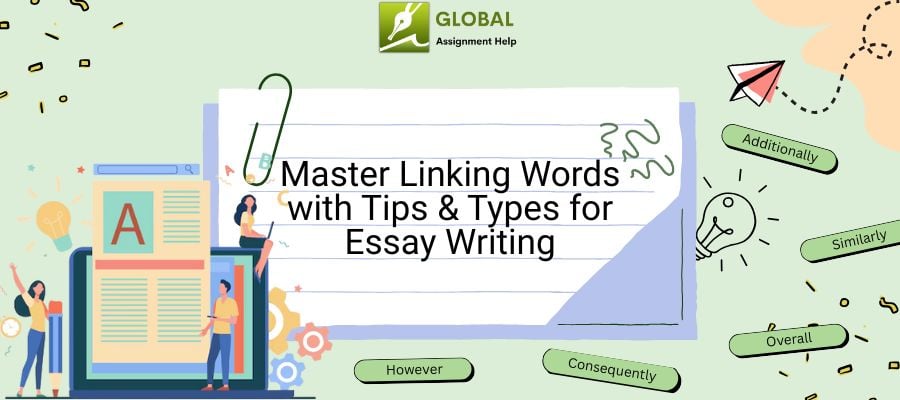Working on academic projects is a challenge when you do not know how to structure the texts. The logical connection between sentences is crucial for conveying the central message of your written work. If you are a student exploring the relevant linking words for your essay then go through this blog. In this guide, you will analyse the use of linking words in academic writing to use them effectively in your essays and assignments.
What Are Linking Words?
Linking words are phrases that connect the sentences and ideas in writing. They build a relationship between two different points to make the writing more organised and easier to understand. These are also known as transition words, which makes your meaning clearer by showing the connection between ideas. For example, they can show case and effect, contrast, sequence or addition to make writing more organised and easier to read.
Get Essay HelpDifferent Types of Linking Words
Connecting words are divided into different types based on the sentences to show a connection for a logical flow. Each type serves a specific purpose in writing to organise the ideas and make them more precise to read. The table below provides linking words examples for each type to help you improve the flow of your writing.
|
Type |
Example Words |
Function |
|
Addition |
Furthermore, Moreover, Additionally, In addition |
Adds extra information or supports an existing idea with more points. |
|
Contrast |
However, on the other hand, in contrast, conversely |
Highlights differences, opposing views, or conflicting information. |
|
Comparison |
Similarly, Likewise, In the same way, Just as |
Shows how two or more ideas are alike or connected in similarity. |
|
Cause and Effect |
Therefore, Consequently, As a result, Thus |
Explains the reason something happened or the effect of an action or decision. |
|
Time/Sequence |
Firstly, Next, Meanwhile, Subsequently, Eventually |
Orders points or events in logical or chronological sequence. |
|
Example/Illustration |
For example, For instance, To illustrate, Specifically |
Provides specific examples to explain or support a general idea. |
|
Emphasis |
Indeed, Certainly, Without a doubt, Undoubtedly |
Stresses or reinforces the importance or certainty of a point. |
|
Summary |
In conclusion, overall, to summarize, all in all |
Wraps up or summarizes the main arguments or points presented. |
|
Clarification |
Namely, That is to say, In other words, Specifically |
Restates or clarifies a point for better understanding or precision. |
|
Result |
Consequently, Accordingly, Hence, Thus |
Indicates a result, outcome, or consequence following a stated reason or event. |
So, these are some common linking words that you can use in your project work. If you are writing an assignment and finding it challenging to use relevant words, then you can seek Assignment help uk from assignment writing services.
Tips for Using Linking Words in an Essay
Using linking words effectively is the key to writing a clear essay. To communicate the ideas more smoothly, understanding the key tips is crucial. These linking words in English make your message more coherent and easier to understand.
Choose the Right Linking Word for the Purpose
You should know that the different linking words serve different functions. For example, if you are using words like and, also, or furthermore ensure that you are adding information. Make sure that every transition word links the sentence and makes sense in relation to the topic you are expressing. It will help your essay to remain clear and logical.
Avoid Overusing Linking Words
While linking words are helpful to make a logical flow of your thoughts, using too many can make your writing sound repetitive. You should use them when it is necessary to use them for a smooth connection. Overuse can distract the readers and make your essay harder to read.
Vary Your Linking Words
If you use the same transition word repeatedly throughout your essay, it makes your writing boring. Try to use different words which have the same meaning to connect your ideas. For example, if you are using however for contrast, you can use nevertheless, on the other hand or yet.
Place Linking Words Correctly
Linking words can appear in different parts of your sentence depending on the type. Where, however, it often starts a sentence, while and connects two words or phrases directly. You should learn the correct placement of the linking words to maintain sentence clarity.
Check for Coherence After Writing
After finishing your essay, it would be great if you read it carefully to ensure the linking words make sense. Editing your work helps you replace weak or incorrect connecting words with better options. It will make your essay more transparent and professional for the readers to understand.
Students Also Read : How to Master DAFOREST Techniques to Make Your Written Content Better?
What are the Effective uses of Linking Words?
The linking words are effectively used for improving clarity and coherence in your writing. These words are crucial for the essays, articles, and web content to guide the readers through your message smoothly. In the below, you will analyse how to use them effectively:-
- Enhance Readability: Linking words guide the readers to connect the ideas and make the content easier to read.
- Show Relationships: Use them according to the sentences to connect causes, contrasts, sequences or examples.
- Organise structure: Start the paragraphs with appropriate transitions to signal shifts in the tone of your sentences.
- Be Contextual: Choose the words that fit the logic of the sentences that are mentioned in your written work.
Linking Words for Different Parts of an Essay
Linking words play a different role in different parts of an essay by connecting ideas logically. Each section of an essay uses appropriate linking words to organise the information and guide the readers. When you understand which linking word fits in which part, you can improve the flow of your writing. In the section below, you will analyse the types of transition words for different parts:-
Transition Words for Essay Introduction
Use these transition words in the introduction paragraph:-
- Starting off
- Opening with
- To begin with
- At the forefront
- At the beginning
- As an introduction
- First and foremost
- The first point to address
- As a starting consideration
- Commencing the discussion
Transition Words for First Body Paragraph
Consider using these linking words in the first body paragraph of the essay:-
- Primarily
- At the outset
- Kicking off with
- By starting with
- To set the stage
- Commencing with
- As the opening point
- The initial focus is on
- To lay the foundation
- Establishing the groundwork
Transition Words for Second Body Paragraph
Here are some connection words that you can use in the second body paragraph:-
- Following that
- Progressing to
- In continuation
- Subsequently
- Continuing on
- The next aspect
- On the next note
- Expanding further
- Building upon this
- To advance the discussion
Transition Words for Third Body Paragraph
Check out the linking words below for the third body paragraph:-
- In light of this
- Moving forward
- As we progress
- In the same vein
- Expanding on this
- Diving deeper into
- To elaborate further
- Additionally speaking
- Carrying this forward
- To explore another angle
Transition Words for Essays Counter
These are some of the transition words that you can use to counter the essay:-
- Yet
- However
- Although
- Argument
- In contrast
- Conversely
- Despite this
- Even though
- Nevertheless
- On the contrary
- On the other hand
Transition Words for Last Body Paragraph
Consider these linking words in the last of your body paragraphs:-
- On a final note
- As a last thought
- The ultimate point is
- To wrap up the body
- Drawing this to a close
- As a final consideration
- Capping this discussion
- Summarising the key points
- To end the body of the essay
- In conclusion to this discussion
Transition Words for Conclusion
You can use these transition words in the conclusion section:-
- To finalise
- In summary
- In retrospect
- Summing it up
- To encapsulate
- Bringing it all to a close
- To synthesise the ideas
- To close this discussion
- To bring everything together
- Drawing the essay to a conclusion
So, these are the linking words that you can use in the parts of essays effectively. You have to understand the purpose of your writing before you start using it.
Get Your essay Today!Conclusion
Learning the use of linking words for essays is essential for writing clear and logical essays. These connectors help to make the ideas flow smoothly and guide the readers through each section, enhancing the overall coherence of your writing. For further information, you can seek help from the essay writing services. These experts will guide you in using linking words effectively.
Frequently Asked Questions
Q1. What are linking words for an essay?
Linking words are connectors that join ideas and sentences to improve the flow & clarity of the essay. They help in maintaining a logical progression throughout the writing.
Q2. What are linking words and examples?
Linking words are phrases that are used to connect thoughts. Examples include, however, addition, for example, similarly, etc. They help express the contrast, cause, sequence, or example in academic writing.
Q3. How to use linking words effectively?
You can use the linking words to show the relationship between ideas. Also, avoid overusing them, choose the best fit for the context which do not break the flow of the argument.
Q4. How to use Linking Words?
Place linking words at the start or middle of the sentence, depending on the type of sentence you are connecting. Always use them logically to maintain the essay's clarity and coherence.
Q5. Which linking word to use at the start of a sentence?
To start a sentence, you can use words like:-
- Firstly
- However
- Moreover
- For example
Choose based on whether you are adding, contrasting, and giving examples before you begin a new idea in your paper.
Q6. Where can I find a list of linking words?
You can find linking words in academic writing guides, grammar books, university websites, or trusted blogs like Grammarly, Cambridge and Purdue OWL. Many of them offer lists for different purposes.
Free Tools

Easy to Use Paraphrasing Tool to Simplify Complex Academic Writing
Check Now
Get Structured Outline by Professionals for Your Dissertation
Check Now
Effortlessly manage citations and references with our smart referencing tool
Check NowPrice Calculator
- Plagiarism
- Pricing
- Order Now
- Call Back
- Live Chat

Limited Time Offer
Exclusive Library Membership + Free 300$ Wallet Balance

Get $300 Now
Update your Number





























Thank you for submitting your comment on this blog. It is under approval. We will carefully review your submission and post it on the website.